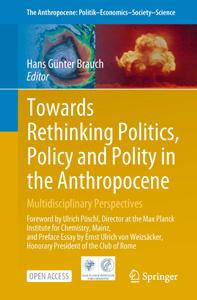
We recommend the publication, co-authored by Prof. Czesław Mesjasz. It is available for download free of charge on the publisher's website.
The publication is part of a peer-reviewed scientific series that deals with a long-term and significant process of transformation in which humanity has become both the cause and a potential solution to global challenges. It focuses on the concept of the Anthropocene, an era in Earth's history during which humans have a decisive influence on the Earth system. This book analyzes political, economic, social, and scientific discourses related to achieving sustainable development. Its main goal is to rethink politics, strategies, and governance in the context of the Anthropocene.
The authors also explore the relationship between the Anthropocene and complexity, peace, security, and patriarchy. They emphasize the need for a new enlightenment to effectively respond to the challenges of this new epoch. This book aims to bring the narrative of the Anthropocene into the mainstream of research in the fields of political science and international relations.
Chapter 3, titled "Anthropocene and Complexity: A Review of Ideas," authored by Associate Prof. dr hab. Czesław Mesjasz, provides an overview of the concepts linking the Anthropocene with various interpretations of complexity. The author offers a systematization and preliminary assessment of the applications of broadly understood ideas related to complexity in the development of the Anthropocene concept and in related areas of environmental studies.
The chapter presents how ideas related to complexity, from mathematical and simulation models to analogies and metaphors, as well as qualitative concepts reflecting the complexity of natural and human systems, have influenced discussions about the Anthropocene. It is noted that the concept of the Anthropocene initially developed without direct influence from contemporary ideas of complexity, which began to be applied in Anthropocene research with some delay.
A key conclusion of the chapter is that ideas related to complexity provide significant support for enhancing the scientific value of policy-oriented reflections on the Anthropocene. This work treats the Anthropocene as a complex phenomenon and describes studies of the Earth system in this context. Furthermore, it illustrates the impact of ideas related to complexity on normative and action-oriented concepts associated with the Anthropocene. The chapter also mentions Stafford Beer’s Viable System Model as a basis for managing sustainable development in the Anthropocene era.

